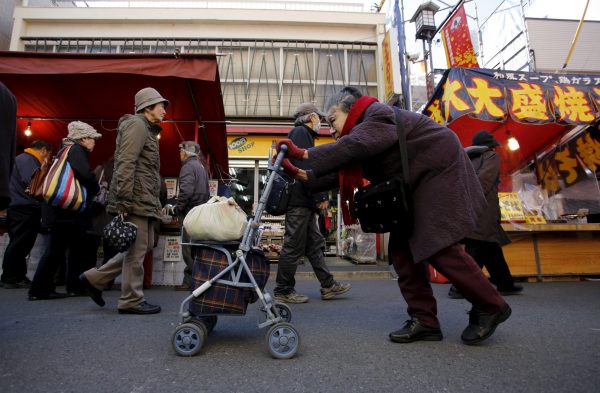Japan’s working-age population is expected to decrease significantly in the future, and labour shortages are quite severe in various industries even in the current situation. The government is traditionally very conservative in opening the door to foreign blue-collar workers, and has avoided changing immigration policy for many years. This is probably due to political considerations — Japan is a largely mono-cultural nation and the Japanese people are likely to be allergic to the term ‘immigrants’.
But this spring, Japan created the ‘Specific Skilled Worker’ visa, a new class of working visa for foreign labourers. It enables blue-collar foreign workers with certain skills to work in simple labour fields in 14 select industries, including aged care and agriculture. In the past, only foreign professionals with high levels of expertise or knowledge have been allowed to stay for working purposes in Japan. This revision is a major transformation of Japan’s immigration policy.
The number of foreign workers accepted in Japan has increased dramatically in recent years — according to the Japanese government, there were around 1.46 million foreigners working in Japan in 2018. Among OECD countries, the yearly inflow of foreign residents was behind only Germany, the United States, and the United Kingdom in 2017.
Acceptance from Asian countries such as Vietnam, the Philippines and Nepal has recently increased in addition to China. Most are unskilled ‘technical interns’ — who can stay in Japan for up to five years — or students working part-time. In 1993 Japan started the Technical Intern Trainee program for international cooperation activities, with the intention of transferring skills to individuals from developing countries.
The new ‘Specified Skilled Worker’ visa is provided in two stages. To be eligible for ‘Specified Skilled Worker No. 1’, an individual must commit to working in one of the 14 fields experiencing serious labour shortages. They must pass tests of the relevant skills and the Japanese language. The period of stay is up to five years, and no family members are allowed to join the worker in Japan. Most of the candidates of this new category are expected to be foreign workers who finish the Technical Intern period.
‘Specified Skilled Worker No. 2’ is given to those who have the relevant advanced skills and long years’ experience in either construction or ship-building — two industries currently in need of foreign labour. There is no limit to the number of renewals of the qualification, and family members are permitted.
It is thought that the government’s decision to review the Immigration Control and Refugee Recognition Act is the result of the intensified voices of small and medium-sized businesses and nursing homes. They have been in great trouble due to labour shortages in recent years. Many companies that are facing labour shortages welcomed the policy change.
The increase in the number of foreign workers has the advantage of alleviating labour shortages and expanding Japan’s workplace diversity, as well as improving corporate connections with foreign countries. On the other hand, an influx of foreign workers may suppress Japan’s wage growth and limit the productivity improvement of domestic industries. But given Japan’s current situation, the merits of this policy change seem to greatly outweigh the disadvantages.
Despite these changes, many challenges remain. First, the existing Technical Intern Trainee system is in need of review. Although this system was originally created to allow foreigners to return to their own country with expanded skills acquired in Japan, it has instead become a tool to cope with severe labour shortages in small companies. This system must be improved and reorganised in accordance with a new ‘Specified Skilled Workers’ system.
Second, very little progress has been made in creating a framework to promote the coexistence of foreigners and local residents. It is extremely important that the local governments and businesses create an environment in which foreigners can live and work comfortably.
And third, Japan must develop a framework to revise and improve the immigration policy as it is being implemented. Together with the recent policy change, the Ministry of Justice established the Immigration Control Agency. This new agency should monitor the areas and industries in which labour shortages are most pronounced, and decide the number of workers and skills required for acceptance appropriately. At the same time, it is necessary to improve the supervision system for foreign workers.
Japan’s society and economy are not sustainable unless it continues to accept foreigners. This is necessary not only to improve economic growth, but also to promote the smooth acceptance and appropriate treatment of foreign residents throughout Japanese society.
Dr Yuri Okina is the Chairperson of the Japan Research Institute (JRI) and Visiting Professor of Keio University, Tokyo.


Not noted here are reports of Japanese companies exploiting so called foreign technical interns by underpaying them, requiring that they work more than their allotted hours, and/or having them perform duties beyond the scope of their contract.
The central government is supposed to set up consultation centers in various cities where foreign workers are to live and work. But per The Japan Times these have not been provided with sufficient funding and/or staff to help new workers with establishing Japanese language proficiency or familiarity with Japanese cultural and social practices so as to make a solid adjustment to living there.